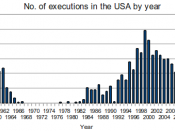The ultimate crime is a very significant issue all over the globe. Some countries choose to punish it with the most severe consequence: capital punishment.
Most countries in the world have had angry debates about the death penalty, for those supporting the cause and those who disagree with it continue to argue. However, at the end of the day, it is the governments alone who decide on its legality.
Several countries exist where such a sentence is not yet applied. Whereas, many others have been actively using it to persuade crime related actions to decease at the lowest rate possible.
Seeing that it is a very delicate issue, those who are not well-informed willform opinions based on prejudice and interfere with the legalization procedure. On the other hand, some choose to be blinded by the mere fact that it is, after all, depriving an individual of his/her life and do not take into consideration the actions and motives which have led the individual to being sentenced to capital punishment.
Depriving an individual from its right to live, is considered the ultimate crime: murder. Crime inevitably embraces our daily society, however murder captures governmental attention more effectively for it attempts against the basic human rights. As a consequence, the jurisdictional powers choose to act severely against it by punishing it with death itself. Nevertheless, those who do not support the method suggested by the authorities protest that no one is morally nor humanly above the condemned and hence have no authority in taking a decision that can even be compared with murder itself. In contrast, some claim that capital punishment is an effective solution and argue that those who are condemned as a result of homicide showed the same unjustified superiority when chose to take the victims life away. Additionally, they believe that lacking a decision maker within the government would corrupt the order which takes place and gives authority to the government.
Some people believe that condemning someone to the capital punishment brings with it too many possible flaws and itÃÂs a risky process, therefore choose to avoid it and to protest against it being that the possibility of condemning an individual which is not fully responsible, exists. Because of this uncertainty, before sentencing, a lot of investigation is carried out in order of full-filling all possible doubts and fully resuming that whoever is being set to the death penalty is indeed the responsible of the crime.
On one hand, some believe that placing the accused life in danger is just as unacceptable as placing any innocent life at jeopardy, for until proven completely otherwise the person is equally innocent as any other civilian. On the other hand, the ignorance which leads them to believe that no previous investigation has taken place and that the decision was made without fundaments, converts these disagreements into biased, narrow-minded opinions.
The possibility of accusing the wrong individual exists, yet several preventions are taken in order of minimizing the probability of this occurring.
Given that the sentence is given after the crime has been committed and is irreversible, the group of civilians who fight against the legalization of a law that would allow the death penalty to become active and to the service of the authorities, have strong opinions which when juxtaposed with the conclusions of those in favor can create mayor discussion and debate. Firstly, being that some might say it is meaningless to punish as consequence of a past occurrence which has no solution whatsoever and demand that solutions have to be applied before the crime takes place, when it can be prevented not punished. Secondly, this group of discontent protestors blame the government for not suggesting alternatives to the put into use the maximum punishment being death penalty, and advice too maintain the un-followers of the law in prison cells. However, I strongly disagree with both the mentioned points. Initially, if the penalization grows more strict and serious fear will rise and this will cause prevention and thought before the action is done and therefore reduce the index of murder rate, whereas if their so called solution was to be put into practice and punishments were to be softened to opt for social and moral conscience, this would be avoided and rejected by many, hence no solution. As for their second suggestion, they have not considered that keeping individuals like the ones punished to death penalty alive and in cells, implies the waste of tax money paid by the community itself into feeding and maintaining criminals, and ignore the fact that alternative forms of punishment have been not only suggested but put into place by the government, yet due to these not being followed theyÃÂre purpose has failed and new means of punishment had to be found.





